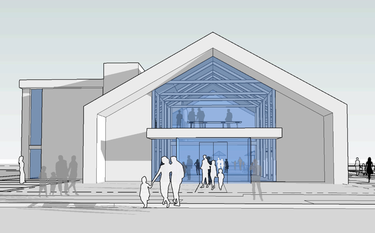Underground Railroad Education Center gets $2M for interpretive center
— Sketch from https://undergroundrailroadhistory.org/
An interpretive center in Albany’s Arbor Hill to further the reach of the Underground Railroad Education Center.
ALBANY — The Underground Railroad Education Center has received $2 million through the New York State Capital Assistance Program to build an interpretive center.
Under the stewardship of its board of directors and co-founders Mary Liz and Paul Stewart, the center tells the story of fugitives from slavery seeking freedom in the years prior to the Civil War.
“Just as our communal ancestors worked for justice, Underground Railroad Education Center carries on in their footsteps, being committed to using what it has for the empowerment of all people to be agents of change toward an equitable and just society,” said the Stewarts in a release announcing the funding.
In the 1990s, the couple founded what was then called the Underground Railroad History Project, which purchased a brick row house at 194 Livingston Ave. that was the home of Black abolitionists Stephen and Harriet Myers.
Stephen Myers was the editor of The Northern Star and Freeman’s Advocate. “We devote all our time to the care of the oppressed who come among us,” he wrote in 1860.
Largely through grants and volunteer efforts, the Stewarts’ organization saved the venerable brick row house that had been on the verge of collapse. It serves as both a museum and a space for meetings and myriad events.
The $2 million will go towards a newly planned interpretive center that will have a commercial kitchen, expanded storage space for artifacts and collections, a children’s center for engaging young program attendees, larger space for indoor programs, exhibits and more.
It is hoped the environmentally friendly facility will ignite excitement about the Underground Railroad story and its contemporary relevance, and provide an uplift to the community, according to a release from the center.
It will also create local jobs and job development experiences for area residents, and expand the center’s impact as a community anchor and tourist destination.
“The Underground Railroad Educational Center will be a welcome addition to the Arbor Hill Neighborhood,” said Albany Common Councilman Jahmel Robinson in the release. “This grant creates the capacity for neighborhood revitalization by creating a space to preserve, recognize and celebrate the rich cultural ties our community has in African-American History.”
“Often, we forget that prominent Albanians, especially Black Albanians and the abolitionist movement, were active in and vital to the success the underground railroad movement throughout much of its history,” said Assemblywoman Patricia Fahy, who, with Assemblyman John T. McDonald III, helped secure the funds.
“Transformative in nature and the largest capital grant secured in recent memory for a local non-profit in the Capital Region, these funds will assist in the construction of UREC’s planned interpretive center,” Fahy’s statement went on, “to continue to preserve this part of our area’s history, and help further explain its contemporary relevance to tourists, visitors, and residents alike.”



